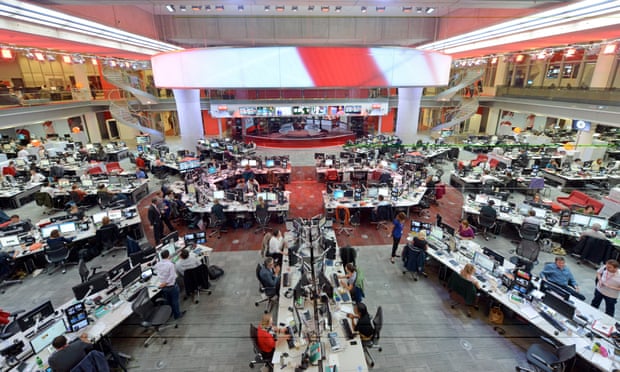BBC considers replacing two news channels with one service
Corporation aims to cut costs by replacing BBC News and BBC World News with new channel for UK and overseas viewers
“This is not a BBC3 situation: BBC News will not be going online only,” said one corporation insider.
The plans also include “enhancing” the output of the 24-hour BBC Parliament, which is expected to broadcast more news from inside parliaments other than Westminster such as Holyrood and the National Assembly for Wales. Mobile news streams are also to be added.
It is not clear how much money will be saved by the decision. In February it emerged that BBC News faces cuts of £80m over the next four years as the corporation as a whole looks to save an estimated £800m a year by 2021-22. The division employs about 7,400 of the corporation’s 18,000 workforce.
As part of the BBC’s overall talent strategy, the cost of on-air and on-screen people in news over the last five years has fallen. The BBC is now to reduce it by a further 10% in real terms over the next five years. BBC News has committed to spending a maximum of 11 per cent of in-house content costs on talent on-air.
When he launched the three-month review in January to reshape the department for the next decade, director of news James Harding said the division “can’t afford to do everything”.
Last week’s white paper urged the BBC to add more distinctive features to its content.
With the BBC under pressure to cut costs, speculation has focused on the future of the News channel, as well as Radio 5 Live and local news.
The BBC News channel alone costs £63m a year but much of its new gathering is used elsewhere in the BBC. Newsgathering in total is the biggest single cost in the whole department.
Radio 5 Live employs fewer people but has a similar annual budget – £66m – because of the high cost of sports rights.
Another potential victim of the need to find savings to cover the £700m annual cost of free TV licences for the over-75s by 2020 is thought to be local radio, which costs £153m a year. BBC plans unveiled as part of its online creative review is likely to promote streaming services rather than channels
The plans also include “enhancing” the output of the 24-hour BBC Parliament, which is expected to broadcast more news from inside parliaments other than Westminster such as Holyrood and the National Assembly for Wales. Mobile news streams are also to be added.
It is not clear how much money will be saved by the decision. In February it emerged that BBC News faces cuts of £80m over the next four years as the corporation as a whole looks to save an estimated £800m a year by 2021-22. The division employs about 7,400 of the corporation’s 18,000 workforce.
As part of the BBC’s overall talent strategy, the cost of on-air and on-screen people in news over the last five years has fallen. The BBC is now to reduce it by a further 10% in real terms over the next five years. BBC News has committed to spending a maximum of 11 per cent of in-house content costs on talent on-air.
When he launched the three-month review in January to reshape the department for the next decade, director of news James Harding said the division “can’t afford to do everything”.
Last week’s white paper urged the BBC to add more distinctive features to its content.
With the BBC under pressure to cut costs, speculation has focused on the future of the News channel, as well as Radio 5 Live and local news.
The BBC News channel alone costs £63m a year but much of its new gathering is used elsewhere in the BBC. Newsgathering in total is the biggest single cost in the whole department.
Radio 5 Live employs fewer people but has a similar annual budget – £66m – because of the high cost of sports rights.
Another potential victim of the need to find savings to cover the £700m annual cost of free TV licences for the over-75s by 2020 is thought to be local radio, which costs £153m a year. BBC plans unveiled as part of its online creative review is likely to promote streaming services rather than channels

Hakuna maoni